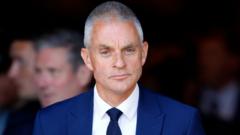Is BBC Boss Tim Davie Ready to Face MPs After a Scandalous Summer?

Published: 2025-09-09 16:24:02 | Category: technology
The recent appearance of the BBC's director-general Tim Davie and chair Samir Shah before the Culture, Media and Sport committee has highlighted the numerous challenges faced by the corporation, including significant controversies surrounding its programming decisions. With calls for accountability and scrutiny over the BBC's role in public life intensifying, this session provided insights into the ongoing battles over the future of the license fee and the corporation's commitment to impartiality.
Last updated: 18 October 2023 (BST)
Key Takeaways
- The BBC faced harsh criticism over its Gaza documentary and other programming decisions.
- Tim Davie and Samir Shah discussed the need for accountability and the importance of the BBC's role in society.
- Future funding and the licence fee settlement are hot topics as charter renewal negotiations approach.
- Davie's leadership has been scrutinised amid several controversies, yet he remains confident in the BBC's direction.
- The political landscape is shifting, raising questions about the BBC's coverage of parties like Reform UK.
Context of the Recent Committee Appearance
The BBC's director-general and chair faced MPs for the second time in six months, a period marked by significant scrutiny and internal strife. The previous session revealed a troubling incident where a documentary about Gaza featured a narrator connected to Hamas. This sparked outrage and was labelled a "catastrophic failure" by Culture Secretary Lisa Nandy. The fallout from this documentary not only led to a breach of the BBC's accuracy standards but also resulted in the cancellation of another Gaza documentary that was subsequently aired by Channel 4.
Recent Controversies
In addition to the issues surrounding the Gaza documentary, the BBC has recently found itself apologising for broadcasting anti-Semitic remarks made by the punk duo Bob Vylan during their Glastonbury performance. This incident added to the growing list of controversies that have plagued the corporation in recent months.
Furthermore, following a review, the BBC was forced to remove presenters from the popular cooking show MasterChef after allegations of misconduct were upheld. These events reflect ongoing challenges within the BBC, where maintaining public trust and adhering to journalistic standards has become increasingly difficult.
Responses from Leadership
During the committee session, Tim Davie and Samir Shah presented a united front, articulating the corporation's commitment to accountability. Davie expressed the pressure he has felt in his role but emphasised that leaders must be held responsible for their decisions. When pressed on whether he had considered resigning, Davie acknowledged the strain but reiterated that it is essential for the BBC to adapt and improve.
The Importance of Accountability
Davie's assertion that "no one is irreplaceable" served as a stark reminder of the high standards expected of BBC employees. His comments highlight the corporation's intention to uphold integrity and transparency, particularly in light of the recent scandals. The leadership's proactive stance in addressing these issues reflects an understanding of the public's demand for accountability within the organisation.
Future Funding and the Licence Fee Debate
As the BBC prepares for charter renewal negotiations, the subject of the licence fee has come to the forefront of discussions. MPs have questioned the fairness of the current funding model, especially in light of changing political dynamics. The political landscape in the UK has shifted significantly, with parties like Reform UK advocating for the abolition of the licence fee. This poses a challenge for the BBC as it navigates its funding model while striving to maintain its relevance in a rapidly evolving media environment.
Adapting to the Political Landscape
During the committee session, Davie was questioned about the BBC's extensive coverage of Nigel Farage and his party, Reform UK. MPs expressed concern about the prominence given to a party with only four MPs. Davie defended the BBC's approach, stating that the corporation must adapt to a fundamentally changed political landscape. The challenge lies in ensuring impartial coverage while staying relevant in a media ecosystem where public opinion can shift quickly.
Moving Forward: The BBC's Vital Role
Throughout the committee hearing, Davie and Shah underscored the BBC's crucial role in public life. The discussion reinforced the notion that the BBC must not only address past failures but also redefine its purpose in an increasingly complex media landscape. As charter renewal negotiations gain momentum, the BBC's leadership will need to continue advocating for its value and relevance to the British public.
Conclusion: What Lies Ahead for the BBC?
The scrutiny faced by the BBC in recent months has raised significant questions about its future direction. With ongoing controversies and a politically charged environment, the corporation must focus on rebuilding trust and demonstrating its commitment to impartiality. The upcoming negotiations surrounding the licence fee will undoubtedly shape the BBC's funding model and operational structure for years to come.
As the landscape continues to evolve, how will the BBC adapt to maintain its standing as a trusted news source? The challenges ahead are daunting, but the necessity for a strong, impartial public broadcaster remains critical for a healthy democracy. #BBC #MediaAccountability #PublicBroadcasting
FAQs
What controversies has the BBC faced recently?
The BBC has faced criticism for its Gaza documentary featuring a narrator linked to Hamas, broadcasting anti-Semitic comments, and allegations of misconduct against MasterChef presenters.
What is the significance of the licence fee debate for the BBC?
The licence fee is a crucial funding mechanism for the BBC. As political pressures mount, discussions around its future could significantly impact the corporation's financial stability and operations.
How is the BBC addressing accountability within its ranks?
The BBC leadership is emphasising accountability by removing staff involved in scandals and asserting that no individual is irreplaceable, reflecting a commitment to high standards of conduct.
What role does the BBC play in UK public life?
The BBC is viewed as an essential public service broadcaster, providing impartial news coverage and educational content, which is vital for informed public discourse and democracy.
How is the BBC adapting to changes in the political landscape?
The BBC is adjusting its coverage strategies to reflect the changing political dynamics in the UK, ensuring it remains relevant and responsive to public interests.



